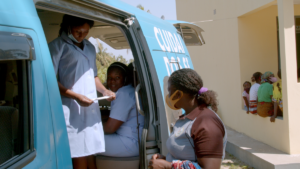 The new mobile eye clinic, launched in Inhambane province, addresses some of the challenges of gender-sensitive eye care in the province. Women and girls have the most difficulty in accessing eye health services and this situation leads to additional discrimination in the context of vulnerability in which they find themselves.
The new mobile eye clinic, launched in Inhambane province, addresses some of the challenges of gender-sensitive eye care in the province. Women and girls have the most difficulty in accessing eye health services and this situation leads to additional discrimination in the context of vulnerability in which they find themselves.
In some districts, testimonies such as Zarifa’s are very frequent: “I have had itchy eyes and blurred vision for a long time now, but in my village, there is no eye care and I couldn’t travel because I have a big family to look after, and I can’t afford transport”.
The mobile eye clinic is able to reach those populations who do not have the resources to travel to health centers and receive the care they need. Women and girls can access an eye check-up and get the diagnosis and even the optical corrections they need when their vision loss is caused by refractive errors. “I heard on the radio that there were going to be consultations, so I came, and they gave me some drops and glasses so I could see well,” explains Zarifa, one of the first women to be seen by the mobile opticians.
It is also a mobile eye clinic run by women from the AMODEVI association, which is responsible for the Vilankulos optician’s shop. Eyes of the world trains and accompanies these women to make this initiative efficient and self-sustainable. “It is a very rewarding job. Not only because it allows me to have a salary and autonomy, but also because when we get to a district, there are already dozens of women waiting for us, who otherwise would not be able to be attended to. It’s extraordinary,” says Zubaida, who is in charge of the optician’s shop.
In addition to “guaranteeing the expansion and coverage of ophthalmology and ophthalmic services for localities where there are no professionals with expertise in specific ophthalmology pathologies,” explains Josefina Chapo, director of the Inharrime District Health Service, the mobile eye clinic also works on new masculinities and “manages to reach more men to make them aware of the importance of women’s and girls’ eye health and promote healthy lifestyles in the family environment,” in the words of Paulo Castro, gender officer of the HOPEM association. He adds: “in societies like Mozambican one, where men have all the power in the family, working with masculinities improves the harmony of the family, men start to dialogue with women, they perceive the importance of health and the perspective on decision-making changes”.
Olga Mamani, an ophthalmology technician in Quissico, Zabala, summarizes: “women have many difficulties in accessing eye care. That’s why we have to make it easier for them to finally get their eyes checked and solve their vision problems”.
For the implementation of this project, Eyes of the world has the support of Barcelona City Council and the Government of Navarre.